|
|
|
Sort Order |
|
|
|
Items / Page
|
|
|
|
|
|
|
| Srl | Item |
| 1 |
ID:
173395
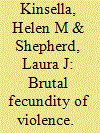

|
|
|
|
|
| Summary/Abstract |
This article highlights Marysia Zalewski's scholarship as reflective and generative of the multifarious sources and contributions of feminist IR and its ‘scavenger methodologies’, which seek to centre subjects, processes, and practices historically excluded, ignored, and minimised. The productive depth of her scholarship is evident in the uniqueness of each article in this collection, all of which distinctly document the uses to which Zalewski's writings can be uniquely put. Each of the articles performs a ‘turning operation’ of sorts on the elementals of feminist IR (gender/women/power/difference) and brings further elaborations of masculinities, sexualities, silences as well as screams, that shift and change what is taken to be feminist research/method – at each point disordering our sensibilities and our assumptions as to what we do when we do feminist work.
|
|
|
|
|
|
|
|
|
|
|
|
|
|
|
|
| 2 |
ID:
071106
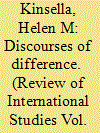

|
|
|
| 3 |
ID:
164978
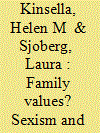

|
|
|
|
|
| Summary/Abstract |
In this article, we focus on the subset of evolutionary theorising self-identified as Feminist Evolutionary Analytic (FEA) within security studies and International Relations. We offer this accounting in four sections. First, we provide a brief overview of the argument that reproductive interests are the ‘origins’ of international violence. Second, we break down the definitions of gender, sex, and sexuality used in evolutionary work in security studies generally and in FEA specifically, demonstrating a lack of complexity in FEA’s accounts of the potential relations among the three and critiquing their essentialist heteronormative assumptions. Third, we argue that FEA’s failure to reflect on the history and context of evolutionary theorising, much less contemporary feminist critiques, facilitates its forwarding of the state and institutions as primarily neutral and corrective bulwarks against male violence. Fourth, we conclude by outlining what is at stake if we fail to correct for this direction in feminist, IR, and security research. We argue that FEA work misrepresents and narrows the potential for understanding and responding to violence, facilitating the continued instrumentalisation of women’s rights, increased government regulation of sexuality, and a more expansive form of militarism.
|
|
|
|
|
|
|
|
|
|
|
|
|
|
|
|
| 4 |
ID:
069826
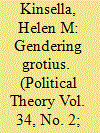

|
|
|
| 5 |
ID:
193657
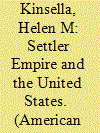

|
|
|
|
|
| Summary/Abstract |
Histories of political science and of the laws of war identify the nineteenth-century scholar Francis Lieber as their modern founder. His 1863 General Orders 100 codified the modern laws of war, internationalizing his political thought. Yet, relatively unremarked is that Lieber wrote his foundational texts during U.S. settler colonization, which he justified in whole. I argue that GO100 facilitated settler colonial violence by defining modern war as a public war, arrogating it to sovereign states; distinguishing revenge from retaliation, attributing revenge to the “savage”; and elevating a certain racialized/gendered governance, ascribing it to the Cis-Caucasian race. Producing Native peoples and Native wars as lacking in the proper characteristics of sovereign belligerency resulted in a subordination of status and a legitimation of exterminatory tactics that were subsequently universalized and (re)internationalized through GO100’s determinative influence on the laws of war. Tracing GO100 further exposes the founding of the discipline in Native peoples’ dispossession and extermination.
|
|
|
|
|
|
|
|
|
|
|
|
|
|
|
|
| 6 |
ID:
175118


|
|
|
|
|
| Summary/Abstract |
In this article, I explore sleep specifically as a weapon of war, as a logistic of war, and as a metaphor for conscience in war. In proposing the capacity to sleep as a measure of the effects of strategies of war, and to recalibrate understandings of intimacy and vulnerability in war, I highlight the distinct effects of war on all its denizens. I make no claim for sameness among their experiences – far from it. And yet, at the same time, I wish to draw attention to what this exploratory essay also conveys, namely, the possibility for a sort of what Judith Butler terms ‘sensate democracy’ in the experience of sleeplessness, exposing a counterintuitive commonality among those deemed friends and enemies. Such a focus brings to the fore that which Simone Weil so powerfully articulated – that violence and force destroy those who wield them and those who are subject to them, potentially reducing each to something less than human, rendering them ‘brothers in the same misery’. Far from facilitating or structuring a relativistic moral equivalence, this potential solidarity provides a form and a measure that, in turn, make way for an analysis of distinct relations of power.
|
|
|
|
|
|
|
|
|
|
|
|
|
|
|
|
| 7 |
ID:
170390


|
|
|
|
|
| Publication |
International Journal Vol: 71 No 4.
|
| Summary/Abstract |
This brief introduction elaborates on Marysia Zalewski's significant body of work over the past three decades, which provides not only ample evidence of the benefits of feminist modes of encountering world politics, but also a robust framework for enquiry for scholars of politics and international relations. Her work, while deeply rooted in feminist theories and practice, has implications which go far beyond disciplinary determinations and touch upon, as the symposium demonstrates, the empirics, and the impact of international politics writ large, from finance to terrorism to violence.
|
|
|
|
|
|
|
|
|
|
|
|
|
|
|
|
|
|
|
|
|